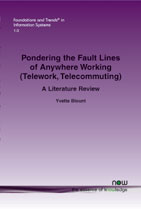Pondering the Fault Lines of Anywhere Working (Telework, Telecommuting): A Literature Review
By Yvette Blount, Macquarie University, Australia, yvette.blount@mq.edu.au
Abstract
Anywhere working (other terms include telework and telecommuting) has been of interest to researchers, policymakers and practitioners for over 40 years. The predicted uptake of anywhere working as a flexible working option has not eventuated to the extent expected. This monograph reviews some of the key areas of research on anywhere working. Achieving the proposed benefits while mitigating the limitations of anywhere working is complex, requiring consideration of many factors including government policy, technology, management and service quality (customer service). The purpose of this monograph is to evaluate the anywhere working research on themes in the literature that provide insights into sustainable anywhere working. Stakeholders including government, researchers, organisations and their employees need to understand how the adoption of anywhere working can provide quantifiable organisational, societal and individual (employee) benefits. This review ponders the fault lines (that is, the tensions and contentions) of anywhere working including a critique of the implications for employees. On the one hand, the proponents of anywhere working argue that the technological advances inevitably lead to this way of working becoming business as usual. On the other hand, detractors of anywhere working point to the limitations, like social and professional isolation, as barriers to full-scale adoption. The monograph concludes by proposing a longterm research agenda to develop a sustainable framework for anywhere working.
Pondering the Fault Lines of Anywhere Working (Telework, Telecommuting): A Literature Review
Pondering the Fault Lines of Anywhere Working (Telework, Telecommuting): A Literature Review considers the expected benefits and limitations of anywhere working over the last 40 years and the extent to which the identified benefits and limitations may be the same or different in 2015. First, the background and history of anywhere working is outlined. Second, the scope and methodology is explained. Third, government policy around anywhere working is examined. Fourth, a discussion of the issues relating to anywhere working and technology. Fifth, the management and employee matters relating to anywhere working. Sixth, the topics relating to service quality and anywhere working. The conclusion, in which a long-term research agenda to develop a sustainable framework for anywhere working is proposed, completes the monograph.
